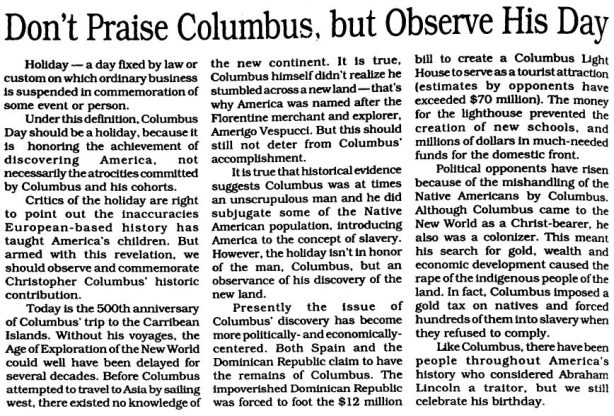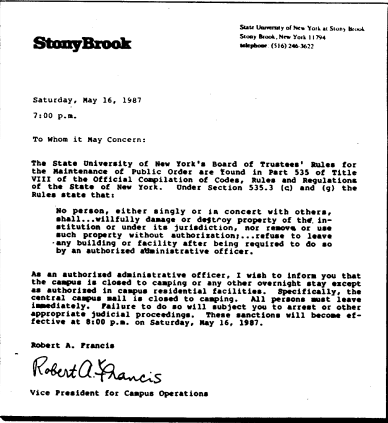
Originally published October 12, 1992
Holiday – a day fixed by law or custom on which ordinary business is suspended in commemoration of some event or person.
Under this definition, Columbus Day should be a holiday, because it is honoring the achievement of discovering America, not necessarily the atrocities committed by Columbus and his cohorts.
Critics of the holiday are right to point out the inaccuracies European-based history has taught America’s children. But armed with this revelation, we should observe and commemorate Christopher Columbus’ historic contribution.
Today is the 500th anniversary of Columbus’ trip to the Carribean Islands. Without his voyages, the Age of Exploration of the New World could well have been delayed for several decades. Before Columbus attempted to travel to Asia by sailing west, there existed no knowledge of the new continent. It is true. Columbus himself didn’t realize he stumbled across a new land-that’s why America was named after the Florentine merchant and explorer, Amerigo Vespucci. But this should still not deter from Columbus’ accomplishment.
It is true that historical evidence suggests Columbus was at times an unscrupulous man and he did subjugate some of the Native American population, introducing America to the concept of slavery. However, the holiday isn’t in honor of the man, Columbus, but an observance of his discovery of the new land.
Presently the issue of Columbus’ discovery has become more politically- and economically centered. Both Spain and the Dominican Republic claim to have the remains of Columbus. The impoverished Dominican Republic was forced to foot the $12 million bill to create a Columbus Light House to serve as a tourist attraction (estimates by opponents have exceeded $70 million). The money for the lighthouse prevented the creation of new schools, and millions of dollars in much-needed funds for the domestic front.
Political opponents have risen because of the mishandling of the Native Americans by Columbus. Although Columbus came to the New World as a Christ-bearer, he also was a colonizer. This meant his search for gold, wealth and economic development caused the rape of the indigenous people of the land. In fact, Columbus imposed a gold tax on natives and forced hundreds of them into slavery when they refused to comply.
Like Columbus, there have been people throughout America’s history who considered Abraham Lincoln a traitor, but we still celebrate his birthday.











